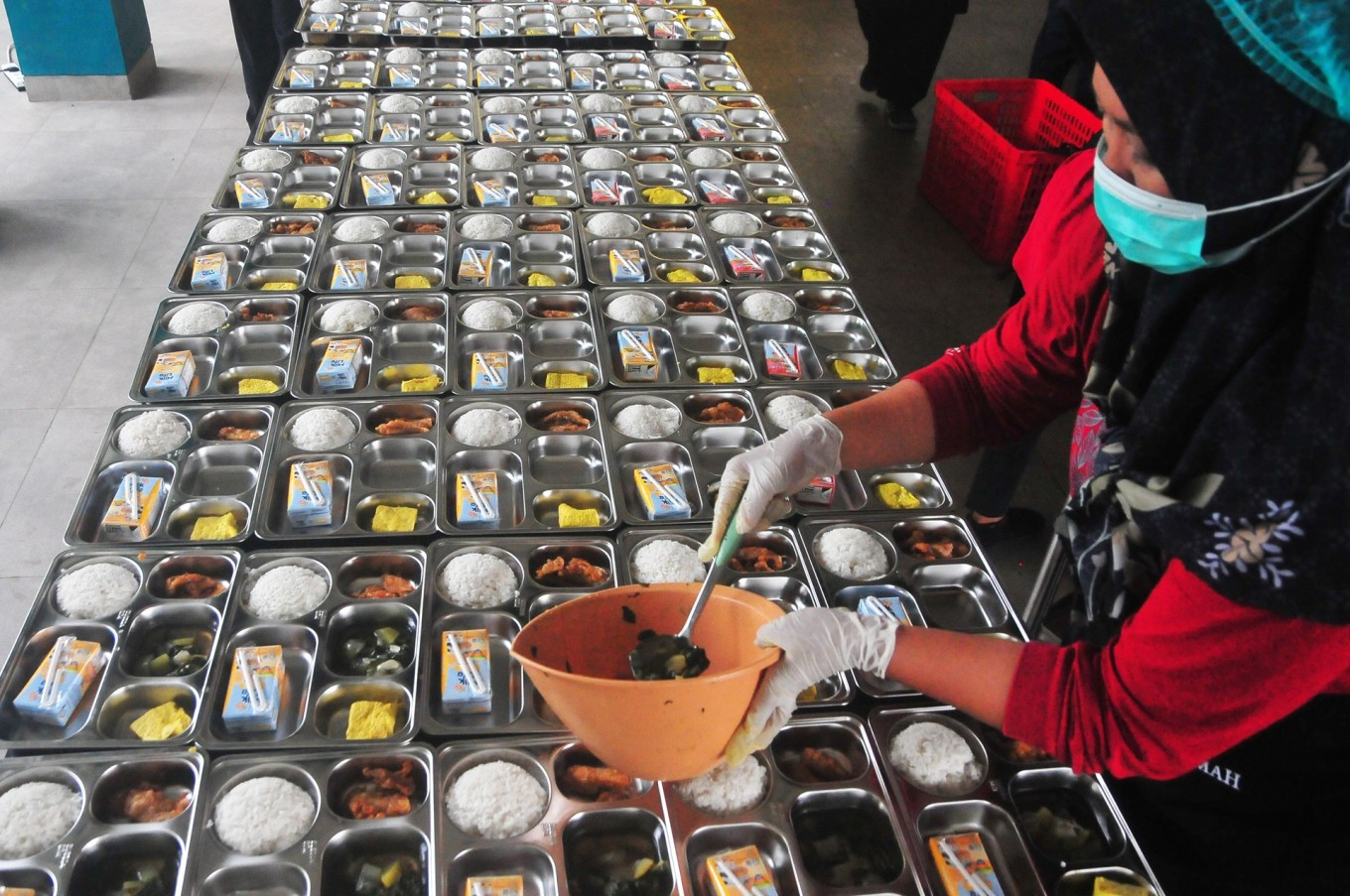News
Free meals program: The devil is in the implementation
Tenggara Strategics July 2, 2025 A worker prepares meal packages for the free nutritious meal program on Feb. 12 in the kitchen of an Islamic boarding school in Kudus regency, Central Java. (Antara/Yusuf Nugroho)
A worker prepares meal packages for the free nutritious meal program on Feb. 12 in the kitchen of an Islamic boarding school in Kudus regency, Central Java. (Antara/Yusuf Nugroho)
The free nutritious meal program, intended to meet the nutritional needs of millions of students, faces significant implementation issues. Despite being a government priority, its large scale lacks organizational discipline and clear institutional alignment, leading to uncoordinated execution, especially concerning its alignment with the academic calendar and school vacations.
Concerns arose when raw ingredients, ultra-processed foods and sugary snacks appeared on the program's menu in some areas of South Tangerang, Banten. These items were distributed by nutrition fulfillment service units (SPPGs) to approximately 4,075 students to be stored at home during the extended school break. However, the head of the South Tangerang City Education and Culture Agency denied any coordination with the SPPGs on this distribution method.
In response, Dadan Hindayana, head of the National Nutrition Agency (BGN), clarified that the program's policy has never included distributing raw ingredients or ultra-processed snacks. He explained that this isolated incident involved only one out of 1,885 active SPPGs and resulted from a field officer's misinterpretation.
Hindayana also noted the program continues during the vacation, serving pregnant women, breastfeeding mothers and toddlers via community health posts or home deliveries.
Edy Wuryanto, a member of Commission IX of the House of Representatives, urged the BGN to finalize technical guidelines for vacation period implementation to prevent future distribution and meal composition issues.
To ensure consistent implementation of this large-scale program, the government has involved the security apparatus, including the police and the Indonesian Military (TNI), blurring civil and military roles.
On June 25, National Police chief Gen. Listyo Sigit Prabowo broke ground for 24 SPPG kitchens in local police precincts in Central Java, aiming to serve around 90,717 beneficiaries within three months. The Army also reported operating 71 kitchens in Jakarta, funded by the BGN, and has constructed 190 of the 1,300 SPPGs planned for 2025. The TNI is tasked with logistical support, distribution, oversight and evaluation, especially near district military commands.
However, Indonesia Corruption Watch (ICW) has expressed concern over the TNI's involvement, viewing it as a breach of the clear separation between civil and military functions in community service programs.
Amid concerns over unclear responsibilities and institutional management, the free meals program's budget has also faced setbacks. Finance Minister Sri Mulyani stated the program was initially set to receive an additional Rp 100 trillion (US$6.16 billion), potentially reaching Rp 171 trillion, to create a multiplier effect for micro and small enterprises.
However, as of June 12, only Rp 4.4 trillion had been disbursed, reaching just 4.89 million of its 82.9 million targeted beneficiaries through 1,716 SPPGs. The government insists on reaching the full target by year-end.
Due to slow budget absorption, the projected funding needs for 2025 have been revised downward from Rp 171 trillion to Rp 121 trillion. For 2026, the BGN is allocated the largest ministry/agency budget at Rp 217.86 trillion, with Rp 210.4 trillion specifically for the free nutritious meal program.
This exceeds the budgets of the Defense Ministry (Rp 167.4 trillion), National Police (Rp 109.6 trillion), Health Ministry (Rp 104.3 trillion) and Social Affairs Ministry (Rp 76 trillion).
According to the Global Child Nutrition Foundation, Indonesia’s free meals program could become the second-most expensive globally, after the United States ($29.4 billion in 2023), and significantly higher than France's third-highest expenditure (just over $10 billion in 2023).
What we've heard
A senior official from a public service oversight agency has sharply criticized the National Nutrition Agency (BGN) for its handling of the free nutritious meal program, citing a significant lack of transparency and proper planning.

